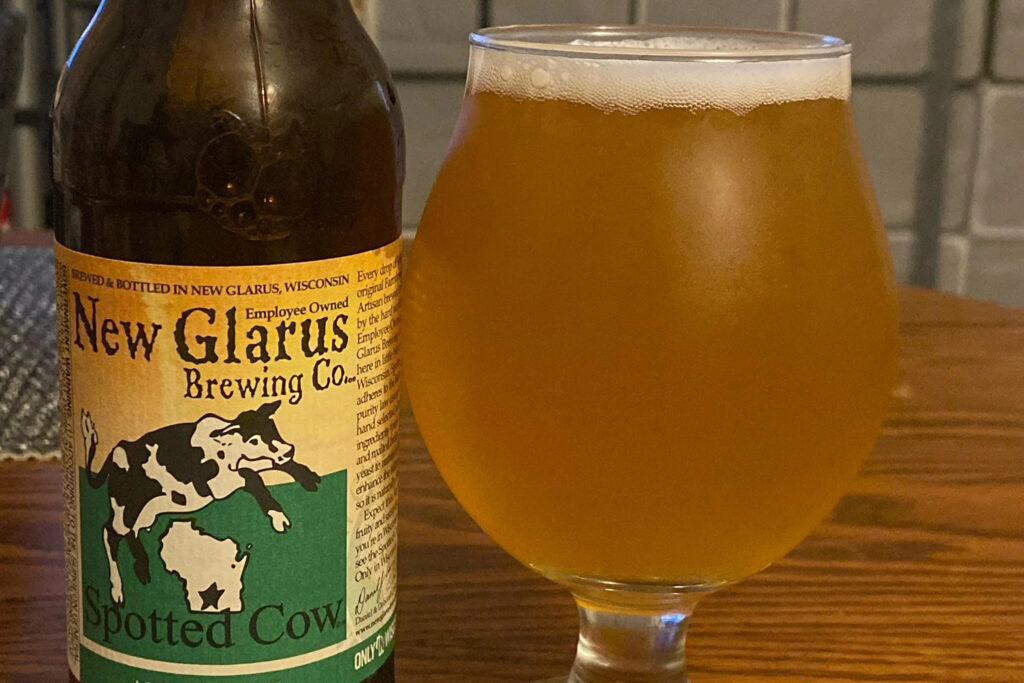Spotted Cow is Mid

Spotted Cow is mid. I’m sorry, Wisconsin, but it has to be said. It’s not bad, but it tastes like a generic light beer that someone spilled fruity coffee creamer into. It’s overhyped, but that’s par for the course when it comes to Wisconsin beer.
Wisconsin needs an ego check. Cheeseheads attempt to own being “the beer state.” It’s probably the state’s main personality trait. But frankly, it’s dubious whether the state that unleashed such obscenities as Pabst and Schlitz upon the world ever really deserved the reputation. What is clear is that, for many years now, Michigan’s beer has been better.
In the past few decades, Michigan’s craft beer industry has exploded. We now have over 400 craft breweries, dotting the map from coast to coast. Pick any exit on 94, 75, or 96 and you’ll probably find a town with a brewery. Munising, for example, the tiny U.P. town home to the Pictured Rocks has a population of less than 2,000 and still has two fully operational breweries catering mostly to summer visitors and outdoorsy winter tourists, many from Wisconsin.
“So what?” the over-proud Wisconsinite might say, “There are probably a dozen small towns in Wisconsin that can say the same, and you haven’t even mentioned Milwaukee.”
Well, Wisconsinites, the most recent available data indicates that Wisconsin has about 280 breweries total. The tasteless corporate brewers that dominate your state have crushed everyone else. And while Milwaukee’s massive commercial brewing industry is certainly impressive, size isn’t everything. When it comes to quality, creativity, and character, all of Wisconsin is outmatched by the large artisan breweries of western Michigan, specifically, Bell’s, New Holland, and Founders. There are many other excellent breweries in Michigan, but these are our champions. Any of these could go toe-to-toe with any Wisconsin company and come out on top, just name a time and place.
First is Bell’s Brewery, founded by Larry Bell as a home-brewing supply company in Kalamazoo in 1983. The company is Michigan’s largest brewery and is the best in the Midwest at making high-quality beer that the average person can enjoy without getting snooty. Bell’s Two Hearted IPA bottle art is an icon: a trout on a slate grey field with hunter-orange text. An American Homebrewers Association survey rated it the best beer in America for four years straight, from 2017 to 2020. And yet, Two Hearted isn’t even the brewery’s most iconic beer. Oberon has its own state holiday in Michigan. A refreshing wheat ale with an iconic sky-blue sunshine bottle cap, Oberon is a seasonal beer that suddenly appears by the pallet during the spring and is sold out by the end of summer. It’s everything that Leinenkugel’s Summer Shandy, a Wisconsin beer icon, used to be before Leinenkugel’s sold out to Anheuser-Busch, censored its “politically incorrect” logo (it had a Native American on it), started injecting corn syrup, and shifted it to year-round production.
Next up is New Holland, Michigan’s largest independent craft brewery. It’s famous for making high-quality barrel-aged dark beers that put hair on your chest. Boring cream ales and fruity IPAs aren’t their main attraction, though they do make excellent lighter options. New Holland‘s most popular brand is “Dragon’s Milk” an 11% alcohol bourbon-barrel-aged milk stout named after the medieval drink heroic knights received after a great victory. None but the most hardy Midwesterners can drink Dragon’s Milk without flinching, and its unique flavor has earned it a cult-following among dark beer enjoyers, reportedly making it one of the top-selling American stouts by volume. Seasonal variants of the stout abound, but the true prize is the Triple Mash, a limited seasonal release aged in bourbon barrels for a year, with a whopping 18.7% alcohol content. It’s so good that it usually sells out in less than a week, even at the steep price of $24 or more for a four-pack. Miller could never.
Last but not least is Founders. The Grand Rapids brewery makes (in my opinion) the best widely available IPA in Michigan, All Day IPA, along with a spectacular raspberry fruit beer named Rübæus, but that’s about as light as the company gets. Like New Holland, Founder’s, which was also founded by home brewing enthusiasts, specializes in darker stuff. Specifically, Founder’s is known for its selections of Breakfast Stouts and Scotch Ales. Canadian Breakfast stout, aged in maple barrels, and Kentucky Breakfast Stout, aged in bourbon barrels, are the No. 1 and No. 2 beers in Michigan according to BeerAdvocate.com with over 20,000 combined reviews. Both received a 4.6 or higher (out of five) which is higher than any beer made in Wisconsin. In fact, the best rated beer in Wisconsin, Black Gold from Central Waters Brewing, would finish fifth among Michigan brews.
Bell’s, New Holland, and Founders on their own are enough to secure Michigan’s spot as the superior beer state in the Midwest, but there are a host of other Michigan breweries that add to our dominance. Mitten Brewing in Grand Rapids won two medals at the 2022 World Beer Cup. Blake’s Hard Cider, from Armada, tied for first at the 2022 U.S. Open Cider Championship. Old Nation Brewing in Williamston and Atwater in Detroit are both incredible as well. It’s an all-star roster.
Meanwhile, what does Wisconsin have to offer? Its best-known breweries pump out Coors and Miller Light. That sentence can stand on its own. Outside of that, there are Leinenkugel’s and New Glarus: one reduced to corn-syrup slop and the other simply overrated. No creativity. No variety.
It’s just the truth: Spotted Cow is mid and Michigan’s beer is the best in the Midwest.
Parker Thayer is an investigative researcher specializing in the funding of nonprofit activism. Follow him on X @ParkerThayer.